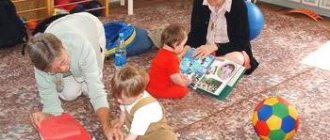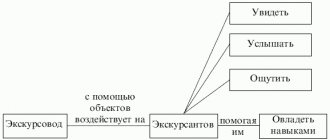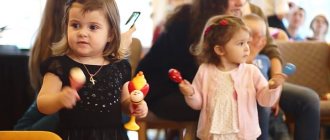Organization of work with parents in kindergarten
Glazunova Svetlana
Organization of work with parents in kindergarten
In conditions when the majority of families are concerned with solving problems of economic and sometimes physical survival, the tendency of many parents from solving issues of upbringing and personal development of the child has increased. Parents , not having sufficient knowledge of the age and individual characteristics of the child’s development, sometimes carry out education blindly, intuitively. All this, as a rule, does not bring positive results.
In Article 18 of the Law of the Russian Federation “On Education”
It says: “
Parents are the first teachers.
They are obliged to lay the first foundations for the physical, moral and intellectual development of the child’s personality at an early age.” Family and kindergarten are two social institutions that stand at the origins of our future, but often they do not always have enough mutual understanding, tact, and patience to hear and understand each other.
Misunderstanding between family and kindergarten falls heavily on the child. It is no secret that many parents are only interested in the child’s nutrition; they believe that kindergarten is a place where they only look after their children while parents are at work . And we, teachers, very often experience great difficulties in communicating with parents for this reason .
How difficult it can be to reach moms and dads!
How difficult it is sometimes to explain to parents that a child must not only be fed and dressed beautifully, but also communicate with him, teach him to think and reflect.
How to change this situation? How to interest parents in working together ? How to make parents participants in the educational process?
Therefore, having recruited a group of kids, I began to work on the problem of interaction between kindergarten and family on the topic “ Organization of work with parents in a modern kindergarten .”
Work to involve parents in the joint activities of the preschool educational institution was carried out in four directions.
Informational and analytical. In order to study the family, clarify the educational needs of parents , establish contact with its members, to coordinate educational influences on the child, I began work with a survey “Cooperation between kindergarten and family ”
.
Having received the real picture, based on the collected data, I analyzed the features of the structure of family ties of each child, the specifics of the family and family education of the preschooler, and developed the tactics of my communication with each parent .
This helped me better understand the pedagogical needs of each family and take into account its individual characteristics. I developed a criterion for myself , which I called the “involvement”
of parents in the educational process. At first, this criterion reflected quantitative indicators of the presence of parents at group events: attendance at parent meetings and consultations; the presence of parents at children's parties , the participation of parents in the preparation and conduct of excursions and thematic classes; participation in exhibitions, opening days; publication of magazines and books; visiting the "Open Day"
;
assistance from parents in equipping the pedagogical process.
Later, I identified qualitative indicators for myself: initiative, responsibility, parents’ towards the products of joint activities of children and adults.
This analysis made it possible to identify three groups of parents .
Parents are leaders who know how and enjoy participating in the educational process and see the value of any work of a child care institution .
Parents are performers who take part subject to significant motivation.
Parents are critical observers. A change in the perception of parents as participants in the educational process has led to a change in the understanding of the types of families: active participants in the educational process, interested in the success of their children; interested, but wanting to solve problems with the help of specialists; indifferent, living by the principle “I was raised the same way”
.
I had the opportunity to have a differentiated approach to parents during joint events.
The cognitive direction is to enrich parents with knowledge in matters of raising preschool children.
In our kindergarten, all conditions have been created for organizing a unified space for the development and upbringing of a child. The joint work of pre-school specialists (speech therapist, teacher-psychologist, activity teacher, physical education instructor, senior nurse) in implementing the educational program provides pedagogical support for the family at all stages of preschool childhood , making parents truly equally responsible participants in the educational process.
Based on the goals of the entire institution, I formulated mine as follows:
1. Creating conditions for a favorable climate of interaction with parents .
2. Establishing trust and partnership with parents .
3. Involving the family in a single educational space.
To coordinate the work of the kindergarten and parents, I set myself the need to solve the following tasks:
1. Activate and enrich the educational skills of parents .
2. Work closely with the families of your students.
For this purpose, I used active forms and methods of working with parents : general and group parent meetings ; consultations; classes with the participation of parents ; exhibitions of children's works made together with their parents ; Days of communication; Days of good deeds; participation of parents in the preparation and conduct of holidays and leisure activities; joint creation of a subject-development environment; work with the parent committee of the group ; trainings; parents' living rooms ; Trust mail; family vernissage.
As a result, the level of educational activities of parents , which contributed to the development of their creative initiative.
Knowing how important the atmosphere of friendly relations between teacher and parents , the first parent meeting “Let’s get to know each other”
I spent it in an unconventional way. I prepared for it very carefully, because the success of the meeting is largely ensured by its preparation.
I selected the music, prepared invitation cards, and tried to create an atmosphere of kindness, comfort and warmth in the group. It began with a greeting and gratitude to send the child to our kindergarten . Game "Let's get to know each other and be friends"
, brought the adults together
(everyone stood in a circle and told a little about themselves)
.
At first everyone was embarrassed, but this feeling quickly gave way to joy and interest. A minute of getting to know each other helped relieve tension, because parents sitting at the same table more than once during the meeting needed to discuss a situation or issue together.
Soft lighting, musical accompaniment, and a friendly tone of narration contributed to the creation of a trusting atmosphere and helped parents talk openly about problems.
For meetings, I prepare an exhibition of children's works or a photo stand , where I use photographs from family albums and the life of the group. At every meeting I express my gratitude to the parents who pay a lot of attention to their children and help in working . It was very nice to see the happy eyes of parents when they were presented with certificates or thanks.
Parents became active participants in all activities in the group, indispensable helpers, and learned to interact with each other as play partners.
Joint events brought me and my parents , parents and children , and made family friends. An atmosphere of goodwill became characteristic of other common activities in the group. Many parents have discovered hidden talents that they were unaware of until they had to draw themselves.
Specialists were invited to the meeting: school teachers, speech therapist, educational psychologist. If at the beginning of the meeting there was some tension, a feeling of uncertainty, anxiety, then by the end of the meeting there was cheerfulness, mutual sympathy, emotional openness and interest in each other.
The form of work through parent corners is traditional. In order for it to be effective and help me to activate my parents, I use the headings: “What and how to keep a child occupied at home”
,
“They asked - we answer”
,
“Children say”
,
“Snub noses”
,
“Grow up”
,
Thank you”,
“ This is interesting”
,
“Let’s play”
,
“With all my heart”
,
“Pay attention”
, in which we include practical material that makes it possible to understand what a child does in
kindergarten , specific games that can be played, tips, tasks.
The activity of parents in creating photo newspapers and exhibitions suggests that these forms of work are in demand. The visual information direction makes it possible to convey any information parents parental duties and responsibilities.
The leisure area in working with parents turned out to be the most attractive, in demand, useful, but also the most difficult to organize . This is explained by the fact that any joint event allows parents to: see their child’s problems, difficulties in relationships from the inside; test different approaches; see how others do it, that is, gain experience interacting not only with your child, but also with the parent community as a whole.
The group held: Mother's Day
,
“Come on, grandmas”
,
“Birthday”
,
“My best family”
, entertainment
“Family gatherings”
,
“April Fool’s Day”
,
“All professions are needed, all professions are important”
(meeting with an interesting person, sports activities
“Family - healthy lifestyle”
,
“Growing Up Day”
, vernissage
“In the world of feelings and emotions”
,
“Our daughters and sons”
, joint projects
“My Pedigree”
, - publication of family newspapers
“I am with my grandmother”
,
“We relax with the whole family”
, birthday celebrations (monthly, exhibitions of family collections, relics
“From Grandma’s Chest”
,
“That’s the Outfit”
, joint trips
“Into the World of Beauty”
, excursions
“We are friends of nature”
,
“Let’s protect our nature”
.
A holiday in kindergarten is joy , fun, celebration, which is shared by both adults and children.
Parents are the dearest and closest people! They saw that the children were proud of them, they wanted to dance, sing songs, and play with them. Years will pass, children will forget the songs that were played at the holiday, but in their memory they will forever retain the warmth of communication and the joy of empathy.
Now it’s a tradition in our group to annually celebrate family holidays “It’s fun to walk together”
,
“We are a happy family”
,
“Holiday of grandparents”
.
Close contact between a child and older family members emotionally enriches family ties, strengthens family traditions, and establishes continuity between generations.
Holiday "Birthday"
for children in the group we celebrate monthly.
Children look forward to this holiday with great impatience: for them it is always an expectation of a miracle, an anticipation of joy. Both children and adults can create small miracles on this day. Your child’s holiday can become a holiday for other children, but adults should take care of this.
Parents prepare a story about the child, bring photographs, and try to show something interesting from the life of the whole family. Together we prepare games, competitions for the whole group, decorate cabinets, beds, and chairs for birthday people.
Children love and look forward to this holiday, they know that they will definitely be congratulated, and they will take with them not only gifts, but a lot of unforgettable impressions.
As a result, children learned to interact with each other as play partners, the group team became more united, and an atmosphere of common interests was created; they became more attentive to each other, friendly, learned a polite form of communication, and developed aesthetic taste.
The participation of families in competitions for the best drawing, napkin, or craft made from natural materials not only enriches family leisure time, but also unites children and adults in common activities.
In modern conditions of kindergarten it is difficult to do without the support of parents . That is why a lot of things in our group are made by the hands of the fathers and mothers of our children. They helped us make a magnetic board, manuals for literacy and math classes, painted colorful pictures for the bedroom, knitted beautiful tablecloths, helped us decorate a duty corner, a nature corner, and an emotional corner. With the help of parents , the group is designed so that every corner is used for the development of children: many toys, a “hospital”
,
"hair salon"
,
"shop"
. In a cozy kitchenette with a sink and gas stove, beautiful dishes, the girls simply love to cook.
Trusting relationships were gradually established in the joint activities of parents and the teacher . At events such as “Days of Good Deeds”
- repair of toys, furniture, group, assistance in creating a subject-development environment in the group, an atmosphere of peace and warm relationships between me and my
parents .
Together we strived to make the children in the group feel good and comfortable. Depending on the work , we jointly drew up a schedule of parental , discussed each event, and solved problems.
Thanks to this, all activities were carried out with great enthusiasm, since during their implementation everyone contributed grains of their labor, skill, and creativity.
The result is a cozy renovated group and bedroom with beautiful curtains and colorful walls, because any work is effective when it is properly organized .
The upbringing and development of a child is impossible without the participation of parents . In order for them to become teacher assistants and develop creatively together with children, it is necessary to convince them that they are capable of this, that there is no more exciting and noble thing than learning to understand your child, and having understood him, helping in everything, being patient and delicate and then everything will work out.
Today we can say that I have developed a certain system in working with parents . The use of various forms of work has yielded certain results: parents from the “spectators”
and
“observers”
became active participants in meetings and assistants to the teacher, an atmosphere of mutual respect was created.
Organizing interaction with the family is difficult work , which does not have ready-made technologies and recipes. Its success is determined by the intuition, initiative and patience of the teacher, his ability to become a professional assistant in the family.
As a result of the work , the use of various forms and methods of communication with parents , the psychological and pedagogical literacy of parents ; The culture of interpersonal interaction among children in the group has improved.
The concept of "interaction"
Often, interaction refers to the usual distribution of roles between educators and parents so as to achieve common goals. But interaction also implies control and feedback. It is important that kindergarten staff exercise unobtrusive control over the situation in families.
Among other things, interaction with the family also means open discussion, exchange of feelings, and communication with the child’s parents. According to the works of I.M. Markov’s interaction with the child’s family is manifested in the unity of the educational process, which can only be built if both parents and educators have the same attitude towards it.
Other sources indicate that the teaching role of a kindergarten teacher has certain characteristics. He should maintain formal and informal interactions with parents. To do this, he needs to be very tactful, he needs to listen to his parents attentively, respect their position. At the same time, edifying intonation should not be allowed when communicating with family members of children.
It will be much more useful to enter into equal relationships with them, based on trust.



